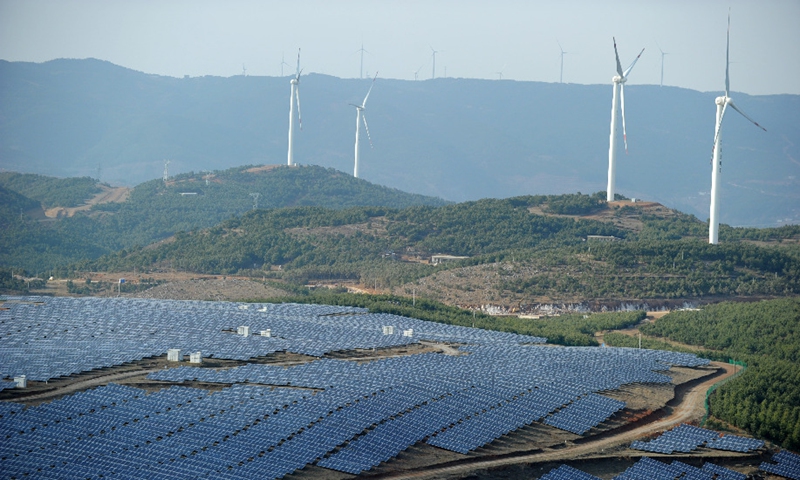
Photo taken on March 13, 2018 shows the Pingjing photovoltaic power station and Dahaizi wind power station in Weining County, southwest China's Guizhou Province.Photo: Xinhua
Facing challenges such as a global energy supply crunch caused by geopolitical confrontations, China has pledged to ramp up efforts to ensure domestic energy security to support economic and social development, a spokesperson said at a press conference during the ongoing 20th National Congress of the Communist Party of China in Beijing on Monday.
"As a large producer and consumer of energy, ensuring energy security is always the priority of the country," Ren Jingdong, deputy director of the National Energy Administration, told reporters.
He said the country will try to increase domestic fuel production and supply. To ensure domestic coal and oil supply, China aims to bring the annual domestic energy production capacity to more than 4.6 billion tons of standard coal by 2025, said Ren.
Meanwhile, China will strengthen construction of fuel storage facilities, including accelerating construction of coal warehouses and liquefied natural gas terminals to ensure reasonable resilience in energy supply, he said.
In the first eight months of the year, the country's coal output rose 11 percent year-on-year to 2.93 billion tons, while crude oil production saw steady expansion during the past three years in a row, and the annual natural gas output increased by more than 10 billion cubic meters for five consecutive years, official data showed.
Ren said that China will also promote the development of clean energy, including wind power, solar power, hydropower and nuclear power, striving to make non-fossil fuels account for one fifth of China's total energy consumption by 2025, and 25 percent by 2030.
And, the country will continue to strengthen the so-called "bottom-line mentality" and risk awareness to improve energy security supervision and an early warning system, according to Ren.
The official said that China's capability in ensuring energy security has been constantly improved over the past decade, with the country's energy self-sufficiency rate being maintained at more than 80 percent which helped withstand the tests of the COVID-19 pandemic, natural disasters and international energy market volatility.
Asked whether China will seek self-reliance by cutting imports on resources including natural gas, crude oil and iron ore, Zhao Chenxin, deputy director of the National Development and Reform Commission, said at the same press conference on Monday that it's a "misunderstanding of China's dual-circulation strategy".
"Currently, economic globalization remains irreversible and no country could develop with its door shut. China has been deeply integrated with the global economy and the international system, with close connections with the industries in many countries," Zhao said, adding that the domestic and external markets are interdependent and reinforce each other.


